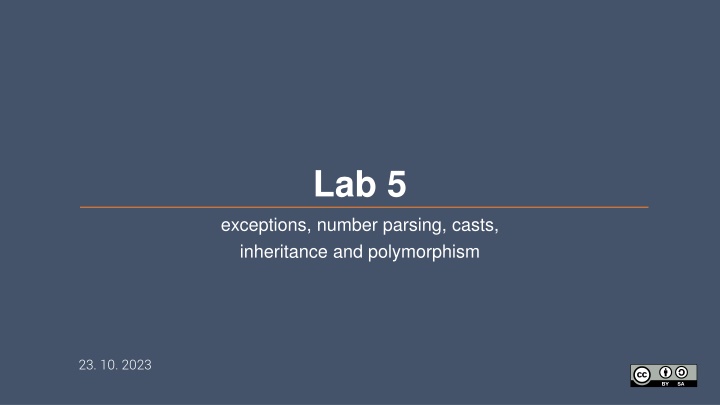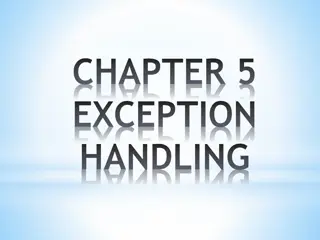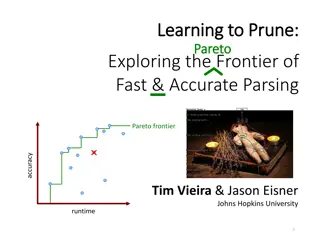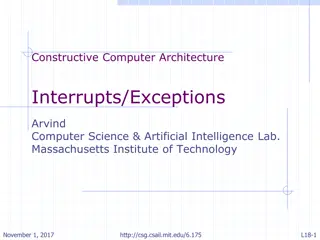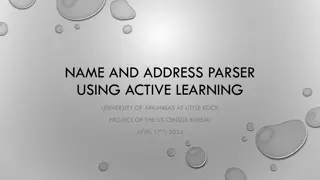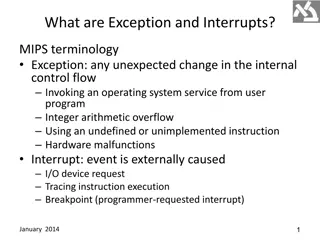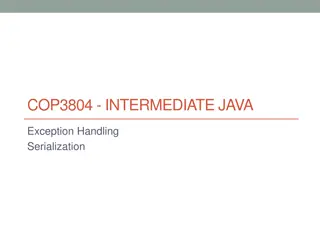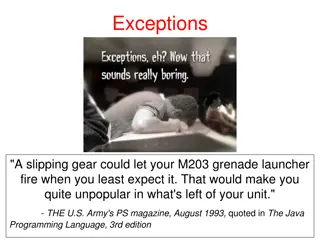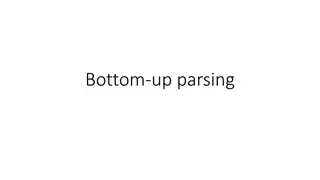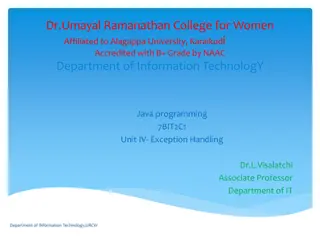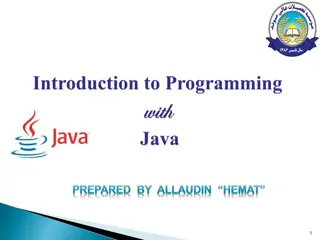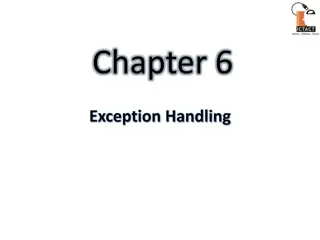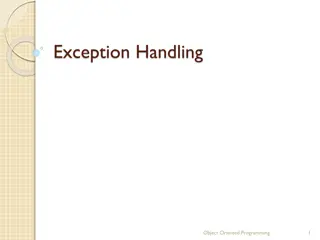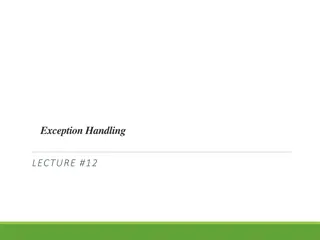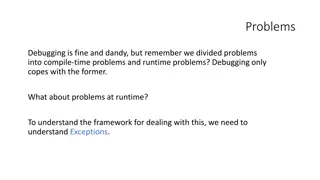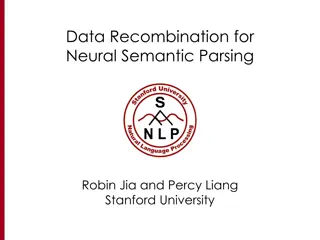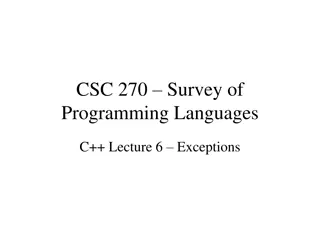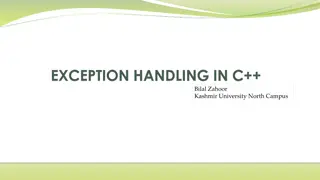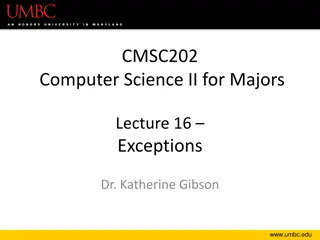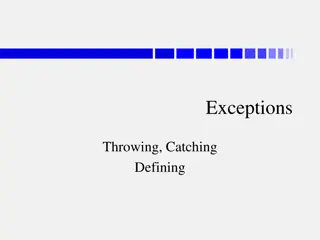Programming Challenges in C++: Handling Exceptions, Number Parsing, and More
Explore the challenges faced in C++ programming labs, from handling exceptions to number parsing, casting, inheritance, and dynamic polymorphism. Discover common pitfalls, such as incorrect copy constructor reuse, returning references to local variables, and issues with deep copying unique pointers. Learn about self-assignment considerations in operator overloading and optimizing code for better performance.
Download Presentation

Please find below an Image/Link to download the presentation.
The content on the website is provided AS IS for your information and personal use only. It may not be sold, licensed, or shared on other websites without obtaining consent from the author.If you encounter any issues during the download, it is possible that the publisher has removed the file from their server.
You are allowed to download the files provided on this website for personal or commercial use, subject to the condition that they are used lawfully. All files are the property of their respective owners.
The content on the website is provided AS IS for your information and personal use only. It may not be sold, licensed, or shared on other websites without obtaining consent from the author.
E N D
Presentation Transcript
Lab 5 exceptions, number parsing, casts, inheritance and polymorphism 23. 10. 2023
Outline 1. Exceptions 2. Number parsing 3. Casting 4. Inheritance 5. Dynamic polymorphism 2023/2024 2 Programming in C++ (labs)
What is wrong #1? The idea is good, to reuse copy constructor But the copy must be moved to `this` *this = std::move(ret) return *this; Bst& Bst::operator=(const Bst& bst) { Bst ret(bst); return ret; } Returning a reference to local variable. 2023/2024 4 Programming in C++ (labs)
What is wrong #2? The code says: Find class `Node`, and call a constructor that would accept `Node&` as a parameter Node contains unique_ptr, it is not copyable by default This is not deep copy! mff::Bst::Node::Node(const mff::Bst::Node &)': attempting to reference a deleted function Bst::Bst(const Bst& other) { if (other._p_tree) { _p_tree = make_unique<Node>(*other._p_tree); // Deep copy the root node } } 2023/2024 5 Programming in C++ (labs)
What is wrong #3? You write this, and you get this mess! Bst(int key) : _p_tree{ std::make_unique<Node>(key) } {} code 2023/2024 6 Programming in C++ (labs)
What is wrong #4? If assigning to self, we d loose the data What if `&tree` == `this` Bst& Bst::operator=(const Bst& tree) { // Clear the current tree _p_tree.reset(); // Do the deep copy of the new one for (auto&& key : tree.keys()) insert(key); } 2023/2024 7 Programming in C++ (labs)
Always remember about self-assignment When implementing operator=, always think about what happens if the `other` is the same instance as `*this` If statement for optimization Beware of some weird behaviour In our Bst class, it only means extra copying It is still correct 2023/2024 8 Programming in C++ (labs)
From the submitted labs Good reusing the existing code reuse the copy constructor in operator= implementation !Good decorating methods as noexcept For now, use only with destructors Putting default/delete into .cpp files Implementing move ctor/operator= when not needed In our case, compiler implementation is OK (we used it in rule of 0 version) Bst::~Bst() noexcept = default; Bst::Bst() = default; 2023/2024 9 Programming in C++ (labs)
Exceptions in C++ #include <stdexcept> You can throw anything. But don t! Throw instances of std::exception, there are many https://en.cppreference.com/w/cpp/error/exception Add your own message They have a method .what() You can define your own class for exceptions Inherit from standard exceptions 2023/2024 11 Programming in C++ (labs)
Exceptions in C++ #include <stdexcept> try { throw std::runtime_error("Nooooo!"); } catch (const int& e) { // Cathces ints cout << e << endl; } catch (const std::exception& e) { // Catches std::exceptions + derived cout << e.what() << endl; } catch (...) { // catches all cout << "Some except!" << endl; } 2023/2024 12 Programming in C++ (labs)
Task 4 c): Exceptions std::runtime_error Use exceptions to signal any runtime error inside the tree methods. Our BST will be an aggressive one! We throw whenever something is a bit off. Catch these exceptions during usage of BST and print the according messages Interface: insert(x) Throw if x is already present Message: "The item is already present!" erase(x) Throw if not present Message: "No item to erase!" contains(x) Throw if not there Message: "The item is not present!" keys() Does not throw (noexcept) 2023/2024 13 Programming in C++ (labs)
Task 4 c): Example inputs hey jude, don't make it bad. =end= hey hey it it jude, jude, bad. bad. make make don't don't D: hey "No item to erase!" D: it "No item to erase!" D: jude, "No item to erase!" D: bad. "No item to erase!" D: make "No item to erase!" D: don't "No item to erase!" hey hey jude don't make make =end= hey hey "The item is already present!" "The item is already present!" D: hey "No item to erase!" 2023/2024 14 Programming in C++ (labs)
atoid, std::stoi, streams, from_chars Error signaled by returnin 0 . what? int i = atoi("42"); double d = atof("3.14"); C style - atoi, atof, #include <cstdlib> C++ std::stoi, std::stof, #include <string> Slow, simple to use using C++ streams #include <sstream>, <iostream> Slow, simple to use Using std::from_chars #include <charconv> Fast, low-level and unfriendly int i = std::stoi("42"); double d = std::stod("3.14"); These throw exceptions on error std::stringstream ss("42 3.14"); int i; double d; ss >> i >> d; cin >> d; These set bad bits, have overloaded bool() operator std::string str = "42"; int value = 0; auto [ptr, ec] = std::from_chars(str.data(), str.data() + str.size(), value); if (ec == std::errc()) std::cout << "Parsed int value: " << value << std::endl; else std::cout << "Parsing failed" << std::endl; 2023/2024 16 Programming in C++ (labs)
Parsing number takeaway Avoid C a-to-whatever If performance isnot an issue use streams or std::s-to-whatever If performance is an issue be careful use std::from_chars 2023/2024 17 Programming in C++ (labs)
Task 4 d): Extend to support floats, ints, strings std::variant Extend it so the values in the nodes can be strings, ints or floats. If you can't parse as other types, it is a string Floats contain decimal dots, integers do not Ordering: floats < strings < ints Use `class Bst` to do the same as in Task 2 and 3 with the following changes: When deleting the node, write also its type string node "hey": "D: (s)hey" int node -954: "D: (i)-954" string float 19.255555: "D: (f)19.3" (print one decimal place!) #include <iomanip>, std::setprecision, std::fixed When EOF is parsed, print the remaining values in their ASC order in the following format: (f)3.14 (f)19.3 (s)hey (s)jude (i)-22 (i)0 (i)954 std::variant::has_alternative or std::visit 2023/2024 18 Programming in C++ (labs)
Coding: std::variant #include <variant> since C++17 A union type Holds exactly one instance of any of the provided types Initialize std::variant<int, float> v(12); // int v = 42.0f; To check what type is inside std::holds_alternative<int>(v) If you know what type is inside std::get<float>(w) Further reading https://en.cppreference.com/w/cpp/utility/variant 2023/2024 19 Programming in C++ (labs)
Coding: std::variant #include <variant> since C++17 Cool thing: std::visit - on list of std::variants, it calls the correct function // helper type for the visitor #4 template<class... Ts> struct overloaded : Ts... { using Ts::operator()...; }; using BaseType = std::variant<int, float, double, std::string>; std::vector<BaseType> vec = { 10, 1.3f, 1.5, "hello" }; for (auto& v: vec) visit([](auto&& arg){cout << arg; }, v); std::variant Any object that has operator() for (auto& v : vec) visit(overloaded{ [](double arg) { cout << "(d)" << fixed << setprecision(2) << arg << endl; }, [](float arg) { cout << "(f)" << fixed << setprecision(1) << arg << endl; }, [](const string& arg) { cout << "(s)" << quoted(arg) << endl; }, [](auto arg) { cout << "(?)" << arg << endl; } }, v); Further reading code https://en.cppreference.com/w/cpp/utility/variant/visit 2023/2024 20 Programming in C++ (labs)
Task 4 d): Example inputs hey 19.3 19.3 jude, don't 3.14 16.8 -156 make -156 954 0 make it -22 bad. =end= it it bad. bad. 16.8 make don't -156 "The item is already present!" "The item is already present!" "The item is already present!" D: (s)it "No item to erase!" D: (s)bad. "No item to erase!" D: (f)16.8 D: (s)make D: (s)don't D: (i)-156 (f)3.14 (f)19.3 (s)hey (s)jude (i)-22 (i)0 (i)954 2023/2024 21 Programming in C++ (labs)
C-style cast and functional-style cast C-style cast Too powerful: tries all possible combinations const_cast, static_cast, reinterpret_cast Do not use! Does to many things! functional-style cast almost the same as C-style only one-word types allowed no CV-qualifiers int i = 42; double d = (double)i; double p = (const char*)i; int i = 42; double d = double(i); 2023/2024 23 Programming in C++ (labs)
static_cast<T>(x) Compile-time type conversion There must be a defined way of conversion E.g. implicit/explicit constructors From -> To // Enum to float int i = 42; float f = static_cast<float>(i); // Enum to int enum class Color { RED, GREEN, BLUE }; int value = static_cast<int>(Color::RED); This is usually safe When casting from Base class to Derived, be sure that it is Derived No checks If not sure -> dynamic_cast! auto p_orig = make_unique<Derived>(); // Pointer downcasting Base* p_b = static_cast<Base*>(p_orig.get()); // Pointer downcasting (with caution!!!) Derived* p_d = static_cast<Derived*>(p_b); 2023/2024 24 Programming in C++ (labs)
dynamic_cast<T>(x) Works only on polymorphic types class/struct with at least one virtual method Used to cast between pointers/references of derived/base class Use for safe downcasting (casting from base to derived) Does runtime check If unable, returns nullptr In case of reference, throws std::bad_cast Base* b_ptr = new Base(); Derived* d_ptr = dynamic_cast<Derived*>(b_ptr); if (!d_ptr) { std::cout << "Downcasting failed!"; } Base& b_ref = *new Base(); try { Derived& d_ref = dynamic_cast<Derived&>(b_ref); d_ref.bar(); } catch (std::bad_cast& e) { std::cout << "Downcasting failed: " << e.what(); } 2023/2024 25 Programming in C++ (labs)
const_cast<T>(x) Used to remove a const qualifier The underlying data must be non-const! // Can be called with non-const parameter void process_int(const int& val) { int& r = const_cast<int&>(val); r = 10; // OK } int x1 = 10; const int x2 = 20; process_int(x1); // OK process_int(x2); // UB, x2 is const Const just went away UB in this case! If you cast away const and modify the value that is const itself, it us UB 2023/2024 26 Programming in C++ (labs)
reinterpret_cast<T>(x) Strong cast for pointers/reference Says to the compiler that it should represent the underlying data as type T Useful for e.g. loading binary data Let's say we have a vector of 100 ints in a binary file Make sure that the endianness of CPU and the file matches Load as a bunch of bytes Reinterpret pointer to int* size_t n = 100; unsigned char* p_byte_buffer; // From now on, we behave like there is an array of ints int* p_ints = reinterpret_cast<int*>(p_byte_buffer); 2023/2024 27 Programming in C++ (labs)
Classes can inherit from each other Just as in C# But multiple inheritance is allowed Be careful with that Use only one as the real base class The rest, just as "interfaces" class Base1 {}; class Base2 {}; class Derived1 : public Base1 {}; class Derived2 : public Base2 {}; class Derived12 : public Base1, public Base2 {}; If the class has at least one virtual function it defines a polymorphic type If holding a reference/pointer to a polymorphic type and calling a virtual method, the dynamic dispatch and vtable is used 2023/2024 29 Programming in C++ (labs)
Warning! Whenever writing a base class for polymorphic types, write a virtual constructor for it even if it is `= default` This will guarantee that the correct destructor will be called in the future when holding a pointer to derived class In the opposite case, the compiler will see pointer to Base, the destructor is not virtual, it does not bother looking into vtable, and will not call the Derived destructor If base for polymorphic, always: virtual ~Base noexcept = default; 2023/2024 30 Programming in C++ (labs)
Typical use case for inheritance Typical problem in practice A container containing different types int, double, string, complex, Bst, ... Other possibilities: use std::variant Technicalites Class GenVector Common ancestor AbstractVal Concrete types IntVal, StringVal, ... E.g. for std::vector<T> Think about the difference Array of values Array of pointers SV IV IV AV AV AV s x x 2023/2024 31 Programming in C++ (labs)
Pointing to the specific type via the base type class AbstractVal { public: virtual void print() = 0; }; class GenVector { public: void add( Valptr p); void print(); private: vector<Valptr> pole_; }; The abstract ancestor provides the interface using Valptr = <AbstractVal>; Vector of references/pointers Type of the reference What to use as ? iterator kam - jin kontejner AbstractVal * low-level, alokace a dealokace AbstractVal & na co reference shared_ptr<AbstractVal> sd len vlastnictv , runtime re ie unique_ptr<AbstractVal> vlastnictv int main() { GenVector s; s.add( <IntVal>(123) ); s.add( <StringVal>("abc") ); s.print(); } The usage 2023/2024 32 Programming in C++ (labs)
Using the generic pointer type #include <memory> class AbstractVal; using Valptr = unique_ptr<AbstractVal>; class GenVector { public: void add( Valptr p) { pole.push_back( move( p)); } void print() { for(auto&& x : pole_) x->print(); } private: vector<Valptr> pole_; }; unique_ptr ownership of the object Using '->', this is a pointer int main() { Seznam s; s.add( make_unique<IntVal>(123)); s.add( make_unique<StringVal>("456")); s.print(); } 2023/2024 33 Programming in C++ (labs)
Constructing the specific types class IntVal : public AbstractVal { public: IntVal( int x) : x_( x) {} virtual void print() { cout << x_; } private: int x_; }; class StringVal : public AbstractVal { public: StringVal( string x) : x_( x) {} virtual void print() { cout << x_; } private: string x_; }; class DoubleVal : public AbstractVal; class ComplexVal : public AbstractVal; class LongintVal : public AbstractVal; class FractionVal : public AbstractVal; 2023/2024 34 Programming in C++ (labs)
What about copying such GenVector? The move operation is handled correctly by the default implementation Move semantics on std::unique_ptr is fine The rule of 0 The default copy implementation is not correct Deleted by default, std::unique_ptr cannot copy We need to define it manually The rule of 5 They are deleted thanks to std::unique_ptr class Seznam { .... Seznam( const Seznam& s) = delete; Seznam& operator=(const Seznam& s) = delete; }; copy constructor and operator= should behave the same 2023/2024 35 Programming in C++ (labs)
Yeah, but I really need the copy! The first try Well, the std::unique_ptr :( So let's copy the object itself But what type shall we construct? Base? It's abstract! No worries, let's instantiate it! GenVector& GenVector::operator=(const GenVector& s) { for( auto&& x : s._data) _data.push_back( x); return *this; } compiler error: XXXX unique_ptr XXX attempting to reference a deleted function GenVector& GenVector::operator=(const GenVector& s) { for( auto&& x : s._data) _data.push_back( make_unique<AbstractVal>( *x)); return *this; } class AbstractVal { public: virtual void print() {} }; compiler error: cannot instantiate abstract class Let's remove the abstract! Don't do that -> slicing 2023/2024 36 Programming in C++ (labs)
Class slicing You construct only the abstract class Your derived fields will be missing It will compile! for( auto&& x : s._data) _data.push_back( make_unique<AbstractVal>( *x)); SV IV IV AV AV AV We wanted this s x x But we get this! The data fields of derived classes are gone! AV AV AV 2023/2024 37 Programming in C++ (labs)
Whats is the solution? You could add an enum value to the instance to see what type it is Don't! Use the abstract class as an interface that requires the derived classes to support a method to clone itself The dynamic dispatch via virtual methods will "choose" the correct type implementation class AbstractVal { public: virtual void print() = 0; virtual Valptr clone() = 0; }; Dynamic dispatch by the type of x IV AV x IV ... operator=(const Seznam& s) { for( auto&& x : s.pole_) pole_.push_back( x->clone()); return *this; } class IntVal : public AbstractVal { .... virtual Valptr clone() override { return make_unique<IntVal>(*this); } }; AV x We construct the correct instance *this if of type IntVal 2023/2024 38 Programming in C++ (labs)
Downcasting in polymorphic hierarchy AbstractVal* av = .... ( ConcreteVal{}); ConcreteVal* cv = .... ( AbstractVal{..}); static_cast You must be sure that the instance is actually the derived Otherwise, use dynamic_cast class AbstractVal { public: virtual void print() = 0; virtual bool operator< (const AbstractVal& rhs) const = 0; }; The interface is a reference to the interface dynamic_cast If the conversion is OK, it will happen and return correct reference/pointer otherwise, it will Throw if reference -> std::bad_conv Return nullptr if pointers class ConcreteVal : public AbstractVal { .... bool operator< (const AbstractVal& rhs) const override { return this->x_ < static_cast<const ConcreteVal &>(rhs).x_; } }; !!! BEWARE !!! !!! BEWARE !!! You must be sure, that the rhs is of ConcreteVal type, if it's not UB! 2023/2024 39 Programming in C++ (labs)
Beware of the diamond problem The multiple inheritance feature allows this In this case the instance of D would contain two copies of A's fields There is ambiguity! class A { public: void foo() { std::cout << ++_a << std::endl; }; int _a; }; // --- class B : public A {}; class C : public A {}; // --- class D : public B, public C {}; D d; // ERROR: ambiguous conversions from 'D *' to 'A *' A* p_d = static_cast<A*>(&d); Further reading https://en.wikipedia.org/wiki/Multiple_inheritance 2023/2024 40 Programming in C++ (labs)
Solution to the diamond problem? Change the design Or use virtual inheritance It changes the way it is handles Apply it to the "middle classes" class A { public: void foo() { std::cout << ++_a << std::endl; }; int _a; }; // --- class B : virtual public A {}; class C : virtual public A {}; // --- class D : public B, public C {}; There you go! Compiles now! Only one copy of _a D d; A* p_d = static_cast<A*>(&d); 2023/2024 41 Programming in C++ (labs)
Task 5: ZOO simulator Using dynamic polymorphism implement a program that simulates a ZOO Support dogs, cats, flies The simulation is driven by the commands (until EOF): buy {dog|cat|fly} {name} {size of portion}, buy dog azor 10 Adds the animal to the zoo sell {dog|cat|fly} {name}, sell dog azor Removes the animal from the zoo restock {units} Adds a certain number of units of food to the zoo warehouse feed Feeds all the animals (each animal eats different sizes), print the remaining food to STDOUT If not enough, throw exception `std::runtime_exception` with the message "Not enough food!" If such an exception is caught, write the message to STDOUT and terminate speak All animals in alphabetic order shall speak (to STDOUT)! After this, make class Zoo copyable! When in doubt, refer to the previous labs -> rule of 5, manual copy, special member functions How animals speak: azor: Woof! micka: Meow! eda: Bzz! 2023/2024 43 Programming in C++ (labs)
Task 5: Inputs & outputs buy dog azor 10 buy dog gigi 12 buy fly eda 1 buy cat micka 6 restock 100 feed sell azor feed speak feed feed feed 71 52 eda: Bzz! gigi: Woof! micka: Meow! 33 14 Not enough food! 2023/2024 44 Programming in C++ (labs)
Coding: 1. Build the class hierarchy for Animal 2. Create Zoo class and sketch the interface 3. Use the interface in the main function 4. Fill in the gaps 2023/2024 45 Programming in C++ (labs)
Intermezzi: std::map<K, V> #include <map> #include <map> A dictionary-type mapping Keys to Values In general, we work with pairs std::pair<KeyType, ValueType> std::map<std::string, std::unique_ptr<Animal>> Is a map that maps strings to owning instances of Animals (and their derived instances) // The direct initialization is allowed std::map<std::string, int> m{ {"CPU", 10}, {"GPU", 15}, {"RAM", 20} }; // Iteration over the map for (const auto& [key, value] : m) std::cout << '[' << key << "] = " << value << "; "; const auto [it, success] = m.insert({"DISK", 55}); m["CPU"] = 25; // update an existing value // (!) Beware that operator[] creates V() if not there m["SSD"] = 30; // insert a new value m.erase("GPU"); m.clear(); Watch out! Further reading code https://en.cppreference.com/w/cpp/container/map 2023/2024 46 Programming in C++ (labs)
Lab 5 wrap up You should know exceptions, number parsing and casts how to use inheritance how to use polymorphism how to avoid slicing how to handle copying of polymorphic types Next lab: Using a build system for a C++ project, CMake, handling dependencies, vcpkg Your tasks until the next lab: Task 5 (24h before, so I can give feedback). Just a directory lab_05 with one CPP file will do This will change in the next lecture :) 2023/2024 48 Programming in C++ (labs)
